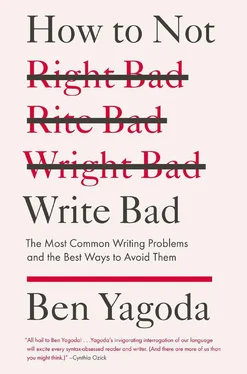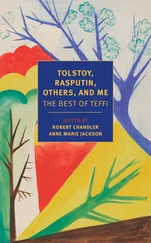[ The president announced an initiative that would will create a new academic department. ]
“Policing the area,” as it were, is an aspect of attentiveness or mindfulness, and it’s not hard to do. So do it.
2. SPELLING
a. Homophone-phobia
Spell-check programs are great. Spell-check programs are a disaster.
Let me explain.
Back in the old days, students would frequently make spelling mistakes like embarass (instead of embarrass ) or influencial (instead of influential ). No more. Modern word processing programs put squiggly red lines under misspelled words or, better yet, silently correct them (as mine just tried to do with embarass ).
The programs are not perfect, even on their own terms. My version of Microsoft Word accepts miniscule unsquiggled, even though the correct spelling is minuscule , and alright even though all right is preferred by every authority I’m aware of. And although Word does in fact indicate that momento (as opposed to memento ) is an error, many of my students apparently don’t believe it, because they go ahead and write momento anyway. I wonder about that, and sentences I get along the lines of:
“The [ pengellem ] is swinging fully against finance reform,” Vogel said.
It is actually quite rare for me to get an assignment with a word as badly misspelled as pengellum, but I’ll devote a minute to this example, because I feel for the student. She was reporting on Vogel’s speech, and rightly recognized that this was a good quote. There was this squirrelly word in it, however. She could sense it was an important word — it was what made the quote a good one, in fact — but she had no idea how to spell it. The only alternative offered by spell-check was entellus, which was surely wrong — and the dictionary didn’t seem to be any help, either. So she just left it. This is another example of the Blind Spot Problem (BSP), the dilemma of not knowing enough to know what you don’t know.
Even though I feel for her, and I recognize that the Blind Spot Problem is profound, I still wrote “NO NO NO” in the margin. What could she have done to avoid this fate?
Have read more. If she had, she would have come across and learned the word pendulum.
Pick up the paper dictionary and read the whole pen- section. There aren’t that damn many words in there.
Alternatively, seek out friends and keep asking, “What’s a word for something that swings, and starts with pen ?” until you find someone who knows.
Back to the far more common spelling problems. Spell-check, in many ways a wonderful innovation, has caused spelling muscles — never especially robust to begin with — to atrophy to the point that they now have the firmness of mint jelly. Even worse, it’s inspired a false sense of confidence, so that students would never even think of checking the spelling of a word in the dictionary.
One major consequence is a sharp increase in the number of bungled homophones — homophones being a pair of words that sound the same but mean different things. A lot of times the mistakes create unintentional humor, and make me want to concoct snarky, New Yorker —style headings, as in:
HE JUST WANTED TO LEND DUDES MONEY
A self described loaner, he wasn’t given to hanging out and the male bonding.
IF THERE IS A MOTE AROUND YOUR HOUSE, CASE IT OUT
These zoning codes might restrict a person from building a mote around her house.
But a little of this comedy goes a long way, and in any case doesn’t win your writing a great deal of respect. Here are some of the most commonly confused words; study them:
Don’t confuse this… with this… Accept:Verb = approve of. Except:Preposition or conjunction indicating difference, as in everyone except Jon went to the party. Allusion:reference, usually literary. Elusion:no such word.
Illusion:fantasy.
Allude:make reference to.
Elude:escape.
Illude:no such word.
Allusive:characterized by having a lot of references.
Elusive:hard to capture or pin down.
Illusive:no such word.
Alusory:no such word.
Elusory:no such word.
Illusory:having the qualities of an illusion. Affect:Noun = in psychology, emotional display. (Accent on first syllable.) Verb = have an impact on. Effect:Noun = impact. Verb = cause, as in effect change. Aisle:corridor or row. Isle:island; should be used only in proper names, such as Isle of Man and British Isles. Bare:Adjective = naked. Bear:Noun = fur-covered animal. Verb = carry, as in a burden; withstand. Bass:(rhymes with pass ) a kind of fish; (rhymes with face ) a low note or the stringed instrument that plays same. Base:Noun = a low common denominator; basis. Verb = establish. Adjective = low, vulgar, mean. Capital:Noun = city that’s the seat of government for a state or country; money. Adjective = uppercase, as in letter; death, as in punishment; excellent, as in idea. Capitol:the building where a legislature meets; specifically, the domed building in Washington, D.C., that houses Congress. Cite:Verb = attribute to a source. Noun (informal) = attribution. Sight:Noun = eyesight.
Site:Noun = place, frequently a Web site. Cue:Noun = a stick you play pool with. Verb (can be followed by up ) = prepare a record or other piece of music to be played. Queue (commonly British):Noun = a line you stand in. Verb (can be followed by up ) = wait in line. Complimentary:free of charge; characterized by or having to do with praise, as in a complimentary letter . Complementary:having the quality of going well together, as in complementary colors. (Extreme complications present themselves in the verb form. One would say, That lipstick compliments your eyes, even though lipstick and eyes may be complementary colors. Oh, well.) Cord:string or thin rope; quantity of firewood; ribbed fabric, as in corduroy. Chord:a pleasing combination of musical notes; (metaphorically) a feeling or emotion. One strikes a chord, not a cord. Faze:disconcert, disturb, or distract. Phase:Noun = period or stage in a process. (Interestingly, the Star Trek weapon is a “phaser” even though it presumably fazes its victims.) Forward:every meaning (adjective, adverb, verb, noun) except for introductory material to a book, which is Foreword. Hardy:able to withstand hardship, as in a plant. Hearty:vigorous and enthusiastic, as in a laugh. Its:possessive of it. It’s:contraction of it is. Lead:Noun = the element; rhymes with said. Verb = first-, second-, and third-person plural present tense of to lead ; rhymes with heed. Led:Verb = past tense of to lead. (Note that past tense of mislead is misled .) Naval:having to do with the navy. Navel:the belly button and the kind of orange, because the thing at the top looks like a navel. Palate:roof of the mouth, or, metaphorically, sense of taste. Palette:tray on which a painter arranges colors, or, metaphorically, the techniques and ideas an artist draws on.
Читать дальше












